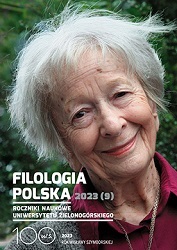Ognosia, or Olga Tokarczuk’s secular theology
Keywords
Abstract
Olga Tokarczuk proposes – both in the Nobel Prize lecture and in her essays – her concept of literature, the features of which are the project she calls ognosia, based on a four-person (panoptical) narrator, or the understanding and function of myth, and more broadly – of all narration. As she believes, her concept can be considered as alter-religious. She refers to the nature of the biblical narrative to – resorting to analogy – describe her view of an author and other components of a literary work. The concept may be interpreted from the point of view of literary theory but also theology. The article is an attempt at such an interpretation. Its author looks for a parallel between literature as understood by Tokarczuk and the Bible as a text revealed and written down by hagiographers. In the conclusion of the sketch, a thesis may be found that Tokarczuk’s idea is not a post-secular or quasi-religious project, but secular and de facto gnostic, because it refers to the knowledge and supposedly divine competence as the foundation for the construction of the world presented.
References
Bilut-Homplewicz Z., Krauz M., Das Konzept der liebevolle Erzähler in Olga Tokarczuks Vorlesung zur Verleihung des Nobelpreises für Literatur. Eine linguistische Analyse, „Zeitschrift für und Literaturwissenschaft Linguistik” 2022, nr 52.
[Google Scholar]
Calasso R., Nienazwana teraźniejszość, przeł. J. Ugniewska, Gdańsk 2019.
[Google Scholar]
Conrad Festival: Spotkanie z Olgą Tokarczuk, [watch] [38-42’].
[Google Scholar]
Draguła A., Powrót wiary, religii czy duchowości? Teolog wobec postsekularyzmu, [w:] M. Ciesielski, K. Szew-czyk-Haake, Szkoda, że Cię tu nie ma. Filozofia religii a postsekularyzm jako wyzwanie nowych czasów, Kra-ków 2018.
[Google Scholar]
Frye N., Wielki kod. Biblia i literatura, przeł. A. Fulińska, Bydgoszcz 1998.
[Google Scholar]
Kantner K., [wypowiedź w:] Czy czuły narrator istnieje? Debata wokół nowej książki Olgi Tokarczuk, 27.12.2020 r.; transkrypcja podcastu: [Czy-czu%C5%82y-narrator-istnieje-Debata-wok%C3%B3%C5%82-nowej-ksi%C4%85%C5%BCki-Olgi-Tokarczuk-transkrypcja-podcastu.pdf].
[Google Scholar]
Koehler K., [wypowiedź w:] Czy czuły narrator istnieje? Debata wokół nowej książki Olgi Tokarczuk, 27.12.2020 r. transkrypcja podcastu: [Czy-czu%C5%82y-narrator-istnieje-Debata-wok%C3%B3%C5%82-nowej-ksi%C4%85%C5%BCki-Olgi-Tokarczuk-transkrypcja-podcastu.pdf].
[Google Scholar]
Kołakowski L., Jezus ośmieszony. Esej apologetyczny i sceptyczny, przeł. D. Zańko, Kraków 2014.
[Google Scholar]
Koziołek R., Humanista sygnalista, [w:] idem, Wiele tytułów, Wołowiec 2019.
[Google Scholar]
Koziołek R., Pani literatura, „Tygodnik Powszechny”, 20 października 2019 r.
[Google Scholar]
Piekarski I., Pismo świeckie. Northrop Frye o literaturze, [w:] T. Garbol, Ł. Tischner, Literatura a religia, t. 1: Teorie i metody, Kraków 2020.
[Google Scholar]
Sosnowski J., W co wierzy Olga Tokarczuk, „Więź” 28.03.3020 r.; [w-co-wierzy-olga-tokarczuk].
[Google Scholar]
Stanzel F., Sytuacja narracyjna i epicki czas przeszły, „Pamiętnik Literacki” 1970, R. LI, nr 4.
[Google Scholar]
Szymik J., Czytajcie Tokarczuk, www.teologiapolityczna.pl/ks-jerzy-szymik-czytajcie-tokarczuk.
[Google Scholar]
Tokarczuk O., Czuły narrator, Kraków 2020.
[Google Scholar]
Tokarczuk O., Najważniejsza jest opowieść, rozmawia K. Maliszewski, „Nowy Nurt” 1994, nr 16.
[Google Scholar]
Tokarczuk O., Świat z odwrotnej strony, „Tygodnik Powszechny” 1996, nr 46, dodatek „Kontrapunkt”, nr 10.
[Google Scholar]
Zając A., W poszukiwaniu nowego uniwersalizmu. O „Czułym narratorze” Olgi Tokarczuk i trzech pytaniach stawianych przez literaturę współczesną, [w:] J. Potkański, M. Libich, A. Zając, Języki literatury współczesnej, Warszawa 2022.
[Google Scholar]
Preview
Downloads
Published
How to Cite
Issue
Section
Categories
Copyright & License

This work is licensed under a Creative Commons Attribution-NonCommercial-NoDerivatives 4.0 International License.
Copyrights (a). In principle, authors who are not employed by the University of Zielona Góra retain the copyright, including publishing rights to the articles, without restrictions.
Copyrights (b). In principle, authors who are employed by the University of Zielona Góra, do not retain the copyright, including publishing rights to the articles. In such cases the copyright holder is the University of Zielona Góra.
































